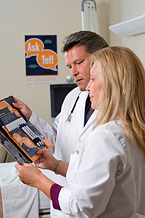Time to Talk
Ask Your Patients About Their Use of Complementary Health Practices
On this page
- Introduction
- What are complementary health practices?
- Why should I ask my patients about their use of complementary health practices?
- How can I find the time to discuss complementary health practices with my patients?
- With so little information available about most complementary health practices, what can I tell my patients?
- Federal Resources for Providers
- Resources for Patients
Introduction
In a nationwide Government survey, nearly 40 percent of all adults age 18 or older reported using some type of complementary health practice, and people age 50 to 59 were among the most likely to report use. According to a survey of people age 50 or older, 58 percent of those who reported using complementary health practices said that they have discussed them with a health care provider.*
What are complementary health practices?
Complementary health practices are a group of diverse medical and health care systems, practices, and products whose origins come from outside of mainstream medicine. They include such products and practices as herbal supplements, meditation, chiropractic manipulation, and acupuncture.
Why should I ask my patients about their use of complementary health practices?
- Most patients do not proactively disclose use to their physicians.
- Patients with chronic and acute medical conditions—including cancer, diabetes, back pain, and depression—turn to complementary health practices in large numbers.**
- As more patients use these practices, you need a full picture of all conventional and complementary practices they are using so that you can effectively manage their care.
How can I find the time to discuss complementary health practices with my patients?
- Include a question about use of complementary health practices on medical history forms.
- Ask your patients to bring a list of all therapies they use, including prescription, over-the-counter, herbal therapies, and other complementary health practices.
- Have your nurse, nurse practitioner, or physician assistant initiate the conversation.
With so little information available about most complementary health practices, what can I tell my patients?
- You can refer your patients to credible, Federal resources to get evidence-based information and patient education materials. You do not need to know everything about complementary health practices.
- Rigorous scientific research on complementary health practices is taking place at major academic and medical institutions throughout the United States.
Federal Resources for Providers
National Center for Complementary and Alternative Medicine: nccam.nih.gov/health/providers
NCCAM Clinical Digest: nccam.nih.gov/health/providers/digest
Online Continuing Education Series
Video lectures available for CME/CEU credits: nccam.nih.gov/training/videolectures
Resources for Patients
National Center for Complementary and Alternative Medicine: nccam.nih.gov
Toll-free clearinghouse: 1-888-644-6226
NCCAM Time to Talk Tips: nccam.nih.gov/health/tips
Medline Plus: medlineplus.gov
This publication is not copyrighted and is in the public domain. Duplication is encouraged.


